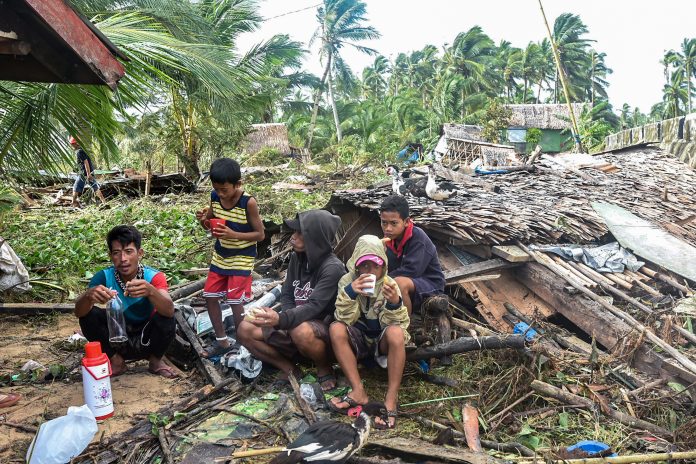We celebrate Christmas, the birth of Jesus amidst the onslaught of Typhoon Odette (international name: Rai). The meaning of Christ’s birth now festooned by commercial and material merriment must be re-examined. Jesus came to the world to redeem and heal humankind from the harm and injustice inflicted on all His creation.
It is in this spirit that the Philippine Misereor Partnership Inc. strengthens our call for a holistic and eco-centric governmental response rooted in efficiency, accountability, and transparency.
The year’s strongest typhoon, reminiscent of the deadly typhoon Yolanda (Haiyan) in 2013, has already affected millions of Filipino people, destroyed thousands of homes and livelihoods – and numbers are still going up.
It is high time that all our governmental structures recognize the interconnectedness of societal issues and implement programs addressing root causes of problems that caused and will exacerbate the national disaster that the typhoon only spurred.
Stronger typhoons are frequenting the Philippines leaving the country with too much loss every time. Each strike reveals the impacts of the government’s weaknesses in implementing laws that protect people and nature – the flooding, the landslides, the piles of trash in rivers and seas, and the lack of potable waters, are just a few examples.
Each strike reveals the vulnerabilities of our society – the increasing loss of jobs, livelihoods, and poverty. The poor in many cases are pushed to consume the remaining natural resources just to be able to live.
With the Philippines garnering at least PhP1.5 billion loss in agriculture, PhP2.5 billion damages in infrastructure, and millions of lives devastated with very scarce resources accessible in order to survive, recover, and move forward in the midst of a pandemic, it is appalling that the administration still has the audacity to make up mind games on alleged “depleted funds.”
Funds are being “scrimped” and the administration is “trying really hard” to allocate PhP10 billion for [disaster response] measures in a typhoon-prone country when almost PhP60 billion were readily spent for military modernization to address COVID-19.
Military machismo in response to the drug war and COVID-19 have never resolved the prevailing issues at its core. Typhoon Odette has crippled many aspects of society and in this regard, we ask for appropriate and intersectional measures to societal issues instead.
To recover from agricultural loss, there is a need to support the national agricultural industry instead of continuous liberalization to sustainably empower our local farmers. Address health concerns of the affected population such as COVID and other water-borne diseases through strengthened healthcare systems. Attend the needs of the vulnerable populations through grassroots actions instead of top-down approaches to policy making. Act on disasters before it is even happening through science and nature-based approaches to conserving and managing the country’s natural resources.
In the age where men played a huge role in causing worsened effects of climate change, more and stronger typhoons will only continue if humanity will continue to live as if nothing is wrong. We will not get out of this endless loop of responding to every pandemic, to every typhoon, species extinction, habitat loss, and climate change unless humans recognize the need to change the systems that propagate such destruction.
The urgency for the social systems to recognize the Rights of Nature is now more apparent than ever. To prevent more deadly disasters from happening, we must protect and conserve the environment that has the power to make or break all living things on Earth.
Replace the systems that massively exploit natural and human resources. Put in place an economic paradigm that prioritizes nature over profit. Build political structures of governance that will protect the ecosystem of each region (bioregions). Develop educational institutions that recognize the interconnectedness and interdependence of all life systems.
Expressing solidarity to the most affected people of this catastrophe, we affirm that fighting the good fight of nature is also fighting for the betterment of humanity. As we call for efficient DRRM measures, a comprehensive plan to address the climate crisis within the climate justice perspective, we call for the Passage the Rights of Nature bill now!









